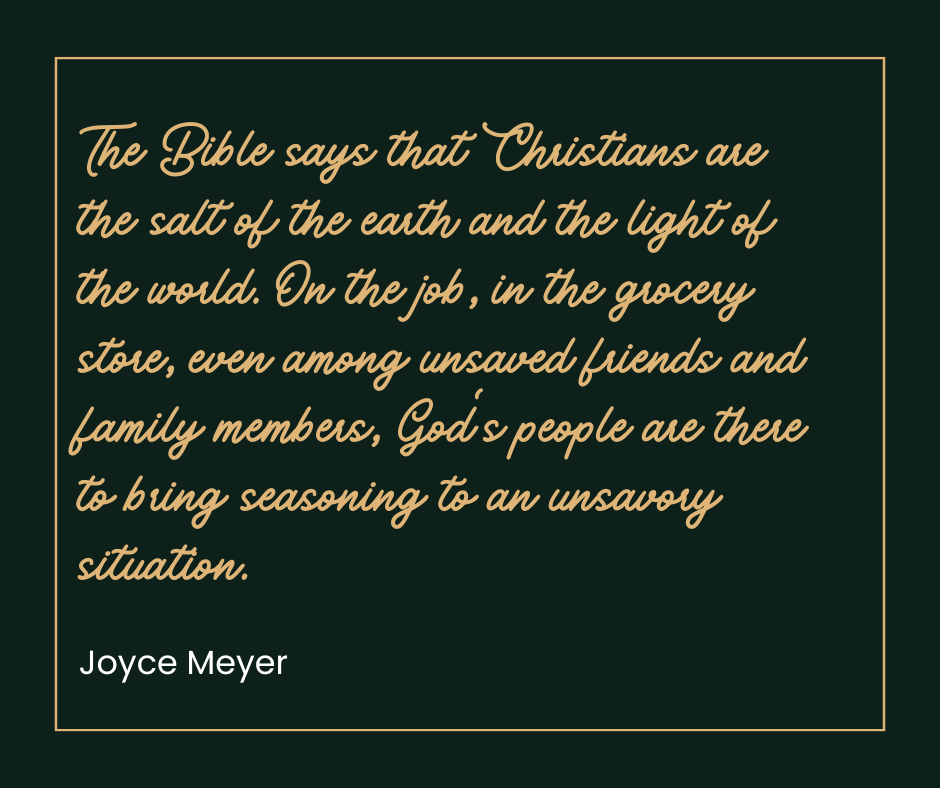Shine Bright and Flavor the World
During the Sermon on the Mount, Jesus brought up the concepts of being the “salt of the earth” and “the light of the world,” both of which accentuate the values and practicalities of Christian living. As followers of Christ, we are called to live our lives as a testament to God's love, grace, and truth. Join us on this journey of understanding what it means to be the salt that preserves, enhances, and positively influences those around us, and the light that shines amidst the darkness, guiding others towards the source of hope and eternal life.

Enhancing Flavor & Preserving Goodness
Matthew 5:13: “You are the salt of the earth. But if the salt loses its saltiness, how can it be made salty again? It is no longer good for anything, except to be thrown out and trampled underfoot.”
In this passage, Jesus uses a metaphor to teach His disciples about their role as the salt of the earth, but what does it mean to be the salt of the earth? Let’s break down the implications of the symbolism.
+Preservation and Flavor: Salt was essential in ancient times for preserving food and enhancing its flavor. Similarly, as the salt of the earth, Christians are called to have a preserving influence in the world by upholding Godly values, morals, and principles. Your reputation and example should hinder those around you from decaying morally and spiritually.
+Positive Influence: Just as salt brings out the best taste in food, Christians are meant to bring out the best in people and situations. Their lives and actions should serve as a positive influence, guiding others toward righteousness, love, and compassion.
+Distinctive Character: Salt has a distinct taste and stands out from other ingredients. Likewise, Christians are called to stand out in society by their character, reflecting the qualities of Christ, such as love, humility, and forgiveness.
+Perseverance in Trials: Salt was used as a symbol of covenantal faithfulness in the Old Testament. As the salt of the earth, Christians are called to remain faithful and steadfast in their commitment to God, even in times of trials and challenges.
+Avoid Loss of Effectiveness: Jesus warns about salt losing its saltiness, which was practically impossible in His time, but He uses it to emphasize the importance of Christians maintaining their distinctiveness and influence. If you compromise your faith or blend in with the world, you risk losing your effectiveness in bringing about positive change.
Basically, to be "the salt of the earth" means to have a positive and transformative influence on the world around you. Just as salt enhances the flavor of food and preserves it from spoiling, being the salt of the earth implies being a force for good, bringing positive change, and preserving moral values.

Being a Beacon of Light That Shines Amidst the Darkness
Matthew 5:14-16: “You are the light of the world. A town built on a hill cannot be hidden. Neither do people light a lamp and put it under a bowl. Instead, they put it on its stand, and it gives light to everyone in the house. In the same way, let your light shine before others, that they may see your good deeds and glorify your Father in heaven.”
Continuing His sermon, Jesus uses another metaphor, instructing His followers to “be the light of the world.” Even though the meaning of this metaphor is plainly expressed, we will briefly dissect it.
+Illumination and Revelation: Light is essential for dispelling darkness and revealing what is hidden. As the light of the world, Christians are called to bring spiritual illumination and reveal the truth of God's love, grace, and teachings to those living in spiritual darkness.
+Guidance and Direction: Light guides and shows the way in darkness. In the same way, Christians are meant to provide guidance and direction for others, leading them toward God and His truth through their actions and righteous living.
+Distinctive Influence: Light stands out in the darkness and is unmistakable. Similarly, Christians are called to be distinct in their conduct, showcasing the love of Christ and making a noticeable impact in the world through their compassion, kindness, and grace.
+Exposing Evil and Sin: Light exposes what is hidden in the darkness. As the light of the world, Christians are meant to confront and expose evil and sin, both in society and in their own lives, and to bring them into the light of God's truth and forgiveness.
+Bringing Hope: Light is a symbol of hope, dispelling despair and bringing comfort. Christians, as the light of the world, are meant to be a source of hope and encouragement, especially during challenging times, offering the assurance of God's love and presence.
+Multiplying Influence: Light spreads and multiplies, illuminating other areas. Likewise, Christians are called to spread the light of Christ's love, inspiring and influencing others to follow Him and become lights themselves.
+Reflecting Christ: Just as the moon reflects the light of the sun, Christians are called to reflect the light of Christ, being His representatives and pointing others towards Him.
Overall, the metaphor of being the light of the world stresses the crucial role of Christians in bringing illumination, guidance, and hope to a world shrouded in darkness.

Embracing the Call
Colossians 4:6 Let your conversation be always full of grace, seasoned with salt, so that you may know how to answer everyone.
As you can see, in essence, both expressions encourage Christians to live a life of virtue, kindness, and compassion, and to use their influence and actions to positively impact others and the world they live in. You also may have noticed that becoming salt and light is a hefty responsibility. Below we will explore various ways you can actively pursue the call.
+Acts of Kindness: Engage in random acts of kindness, such as helping a neighbor, volunteering at a local charity, or assisting someone in need.
+Live with Integrity: Maintain moral principles and let your actions align with your beliefs.
+Stand for Truth: Speak up for what is right and just, even in challenging situations. Let your words reflect the truth and wisdom found in the Bible.
+Study the Bible: Regularly study the Bible to deepen your understanding of God's word and how to apply it to your life.
+Show Love and Compassion: Demonstrate genuine care and empathy towards others, regardless of their background or circumstances. Love your neighbor as yourself.
+Engage in Prayer: Pray for others and their needs, seeking God's guidance and comfort for those facing challenges.
+Be a Good Listener: Offer a listening ear and emotional support to those going through challenging times, showing empathy and understanding.
+Speak Encouraging Words: Use positive and uplifting language to inspire and encourage others, spreading hope and optimism.
+Live humbly: Avoid arrogance and pride, recognizing that your purpose is to glorify God and not yourself.
+Be a Peacemaker: Seek to resolve conflicts and promote harmony among people. Strive for reconciliation and forgiveness.
+Share the Gospel: Proclaim the good news of Jesus Christ through both words and actions. Be willing to share your faith when appropriate and invite others to experience God's love.
+Support the Vulnerable: Extend care and support to the marginalized, such as the poor, the sick, or the oppressed, advocating for justice on their behalf.
+Set a Positive Example: Be a role model for others by displaying integrity, kindness, and love in all your interactions.
+Serve others: Look for opportunities to help and serve those in need. Volunteer for charitable organizations, support your community and be a source of comfort and assistance to those facing challenges.
+Live Ethically: Make conscious choices in daily life that align with Christian values, such as being environmentally responsible or promoting fair trade practices.
+Be Thankful: Cultivate a spirit of gratitude and thankfulness, expressing appreciation to others and to God for His blessings.
Living as the salt and the light is not about grand gestures but about consistently embodying Christ's love and letting His presence shine through with small and meaningful acts of everyday life.

Outcomes of Embodying the Metaphors
Ephesians 5:8-13: For you were once darkness, but now you are light in the Lord. Live as children of light (for the fruit of the light consists in all goodness, righteousness, and truth) and find out what pleases the Lord. Have nothing to do with the fruitless deeds of darkness, but rather expose them. It is shameful even to mention what the disobedient do in secret. But everything exposed by the light becomes visible–and everything that is illuminated becomes a light.
When you fervently strive to epitomize what it means to live as the salt and light, undoubtedly, you will be met with an abundance of blessings.
Being the salt and light means actively serving and caring for others. When you listen to, support, encourage, guide, and serve others, you can instill hope, optimism, and comfort in them. Your character invites others to come to you when they are struggling or facing challenges, it shapes and empowers you to serve more effectively. The empathy, kindness, mercy, and compassion you demonstrate will be integrated into who you are. You become a person of trust, a person who provides direction, and a person who supplies endless encouragement and support. You will be living out your faith, truly following the commandment to love your neighbor, while making a meaningful difference in the lives of others.
The influence of your actions, words, and character will not go unnoticed. You are serving as a witness to God’s will and love. This can draw others to inquire about the source of your hope and joy, providing opportunities to share the Gospel. Sharing the Truth is in accordance with the mission of “making disciples of all nations,” discussed in Matthew 28:19-20. Your efforts may have lasting effects, impacting not only the present but also preparing yourself and others for eternal salvation.
But your example doesn’t stop there. It can be far-reaching, impacting the lives of more people than you may realize. When you continually live according to God’s principles, you contribute to making the world a better place, a more moral place, one filled with love, kindness, and truth. Your example promotes positive changes in the people around you, motivating them to embrace goodness, reconciliation, and compassion. Those people can then be an inspiration to another, and another. Before you know it, your influence has led to a chain reaction, one that endorses unity and allows mankind as a whole to become more harmonious and loving.
Not only will you be a witness to your faith for others, but you will also witness God’s work firsthand. Recognizing God working through you can bring you immense peace and joy. When you understand that your actions can make a difference and contribute to the greater good, you find a sense of purpose and meaning in your life. By fostering a life of love, humility, and sacrifice, you warrant your personal and spiritual growth to bloom. As your faith grows, you develop a deeper relationship with God.
Finally, Jesus is referred to as the Light of the World, and as such, it is our duty to strive to emulate His teachings and character. By being the light, you mirror Christ's love, forgiveness, and selflessness to others, taking the form of a representative and ambassador of His compassion by allowing His presence shine through you. It is the ultimate opportunity to glorify and honor Him.
Living as the salt and light of the earth is both a privilege and a responsibility. By living out our faith in practical ways, showing kindness, compassion, and righteousness, we can positively impact those around us and be a source of hope and guidance to a world in need. It is a way to actively participate in God's redemptive plan for humanity and to impact the world positively with His love and truth.

Final Remarks
Clearly, embracing the call to be the salt and light of the world is not merely an option but a profound responsibility for every follower of Christ. As believers, we are entrusted with the privilege of positively influencing our surroundings, preserving God’s purpose, and illuminating the darkness with the truth of His love and grace. By living as the salt and light, we embody Christ's teachings and become powerful agents of change in a world hungering for hope and goodness. Our actions, words, and character can create a ripple effect, touching hearts, and leading others towards the eternal source of light. Let us, therefore, embrace this divine mission with passion and determination, for by doing so, we fulfill our purpose of bringing glory to God and making a lasting impact on the lives of those around us. Together, let our collective efforts shine brightly, and may our commitment to being the salt and light illuminate the path for others to find their way to His grace.

- Torrance Church of Christ




 ~
~





